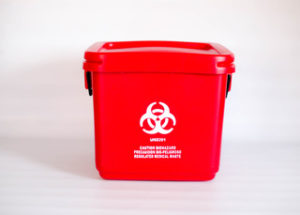Environmental Responsibility: The Eco-Friendly Approach to Medical Waste Disposal
Environmental Responsibility: The Eco-Friendly Approach to Medical Waste Disposal
Blog Article
Recognizing the Different Kinds Of Waste Disposal Strategies
In the world of waste monitoring, the array of disposal methods offered today is vast and varied, each technique offering a distinctive function in attending to the obstacle of garbage disposal. click here. From recycling approaches that aim to provide brand-new life to products, to the intricate processes of contaminated materials monitoring, the landscape of garbage disposal is complex yet essential for ecological sustainability. Recognizing the subtleties of these various strategies not just clarifies the significance of liable waste administration however likewise triggers us to reconsider our technique in the direction of garbage disposal in a swiftly advancing globe

Recycling Techniques
Recycling approaches are vital for sustainable waste monitoring methods in both domestic and commercial setups. medical waste removal service. By implementing reliable recycling techniques, a substantial amount of waste can be drawn away from garbage dumps, conserving all-natural resources and minimizing the environmental effect of production processes
In residential areas, curbside recycling programs play an essential function in motivating homes to different recyclable materials from general waste. Products such as paper, plastics, glass, and metals can be arranged and accumulated for processing right into brand-new products, minimizing the need for basic materials and energy-intensive production processes.
Industrial facilities additionally count on reusing approaches to reduce waste generation and advertise a circular economic climate. By applying closed-loop systems, companies can recycle products within their production processes, lowering expenses and ecological impact. medical waste removal service. Furthermore, commercial recycling programs often include collaborations with specialized reusing facilities to guarantee that materials are appropriately arranged, processed, and reintegrated into the supply chain
Composting Methods

Oxygenated static heap composting includes mixing natural waste materials in a huge stack and frequently turning it to ensure proper oygenation. This method is reliable for massive composting operations. On the various other hand, vermicomposting utilizes earthworms to damage down organic issue into nutrient-rich spreadings. This technique is appropriate for smaller-scale operations and families.
In-vessel composting includes positioning organic waste in a shut container with controlled problems for temperature and oygenation. This approach works for managing food waste in city locations. Lastly, windrow composting includes creating long rows of organic waste and on a regular basis turning them to promote decay. This strategy is commonly used in agricultural setups.
Garbage Dump Disposal
Landfill disposal is a generally utilized technique for taking care of waste that can not be recycled or composted. It includes burying waste in assigned locations of land, with proper precautions to protect against environmental contamination. Land fills are engineered facilities created to separate waste from the surrounding environment. The waste is compressed and covered with dirt daily to decrease smells, hinder pests, and reduce the spread of trash. Modern land fills are furnished with safety linings and keeping track of systems to stop leak of hazardous compounds right into the dirt and groundwater. Methane gas, a result of visit this website decomposing organic waste in garbage dumps, is commonly accumulated and made use of as a source of renewable resource. Despite developments in garbage dump innovation, worries remain regarding the long-lasting ecological effects, such as groundwater contamination and greenhouse gas discharges. Initiatives to minimize reliance on garbage dumps include promoting waste reduction, recycling, and exploring different garbage disposal approaches to decrease the ecological impact connected with standard garbage dump disposal practices.

Waste-to-Energy Incineration
Incineration of waste for energy generation is a technique significantly being considered as an option to traditional garbage dump disposal methods. Waste-to-energy incineration includes the combustion of waste products at heats, commonly in specialized facilities created to create electricity or warm with the procedure - click here. This technique not only lowers the volume of waste that would or else be predestined for garbage dumps however likewise utilizes the warmth produced during incineration to produce power
One of the essential benefits of waste-to-energy incineration is its capacity to produce electricity while reducing the ecological influence contrasted to conventional landfill disposal techniques. By transforming waste right into power, this strategy aids in reducing greenhouse gas emissions and reliance on fossil gas for power generation. In addition, waste-to-energy centers are outfitted with innovative air contamination control technologies to mitigate potential toxic wastes released during the combustion process.
Hazardous Waste Management

Taking into consideration the essential relevance of accountable waste administration practices, particularly in the world of ecological sustainability, the focus now changes in the direction of the elaborate domain of Contaminated materials Administration. Contaminated materials positions significant threats to both human health and wellness and the environment, necessitating customized handling and disposal strategies. Usual instances of dangerous waste include chemicals, batteries, chemicals, and electronic waste.
Contaminated materials Administration involves the recognition, collection, transportation, therapy, and disposal of products deemed unsafe or possibly dangerous. This procedure calls for adherence to strict policies and guidelines to alleviate unfavorable influence on ecological communities and public health and wellness. Different approaches are utilized in taking care of harmful waste, including recycling, protected land fills, encapsulation, and chemical treatment.
Correct Contaminated Materials Monitoring is essential for protecting against contamination of soil, water resources, and air contamination. It is vital for sectors, laboratories, health care centers, and other generators of harmful waste to apply robust administration approaches, training programs, and emergency action intends to ensure the risk-free handling and disposal of these products. Failing to manage contaminated materials suitably can have far-ranging consequences, highlighting the value of attentive and responsible techniques in this area.
Conclusion
In verdict, waste disposal strategies play a critical duty in handling and lessening the effect of waste on the environment. It is important for people and sectors to understand the various waste disposal methods offered and choose the most ideal approach for sustainable waste management.
In the world of waste monitoring, the range of disposal techniques readily available today is huge and varied, each method offering an unique objective in resolving the difficulty of waste disposal. click here. From reusing techniques that aim to offer brand-new life to materials, to the intricate procedures of harmful waste management, the landscape of waste disposal is intricate yet critical for ecological sustainability. Understanding the subtleties of these different techniques not just drops light on the importance of liable waste administration but additionally prompts us to reassess our approach towards waste disposal in a swiftly developing globe
Initiatives to reduce dependence on landfills consist of promoting waste decrease, recycling, and discovering alternative waste disposal approaches to reduce the ecological footprint linked with conventional land fill disposal practices.
It is vital for industries and people to recognize the different waste disposal strategies available and select the most appropriate technique for lasting waste management.
Report this page